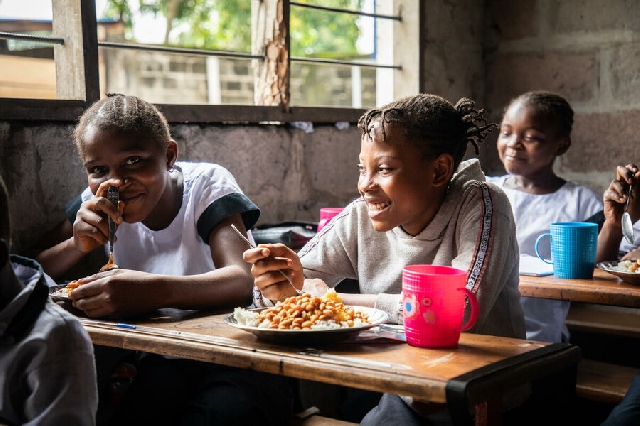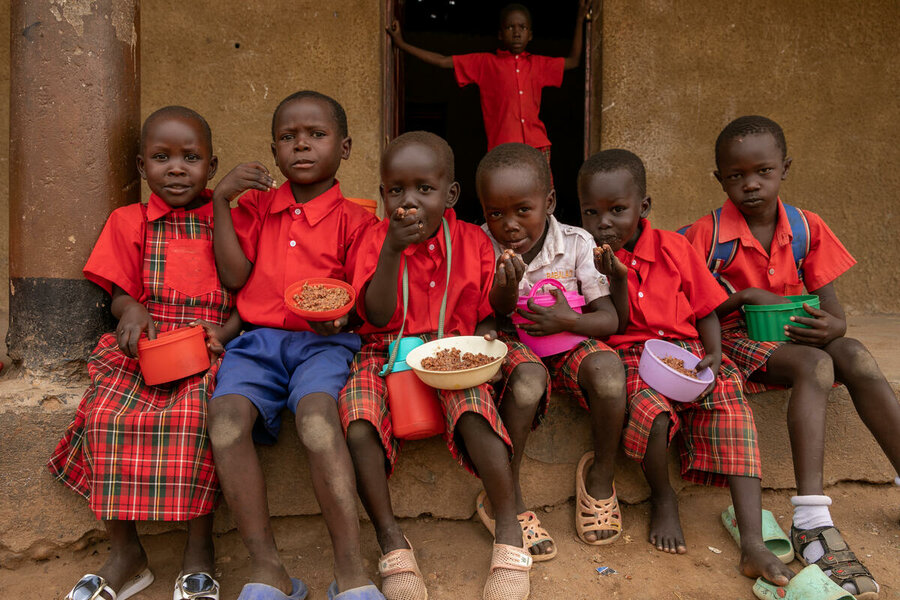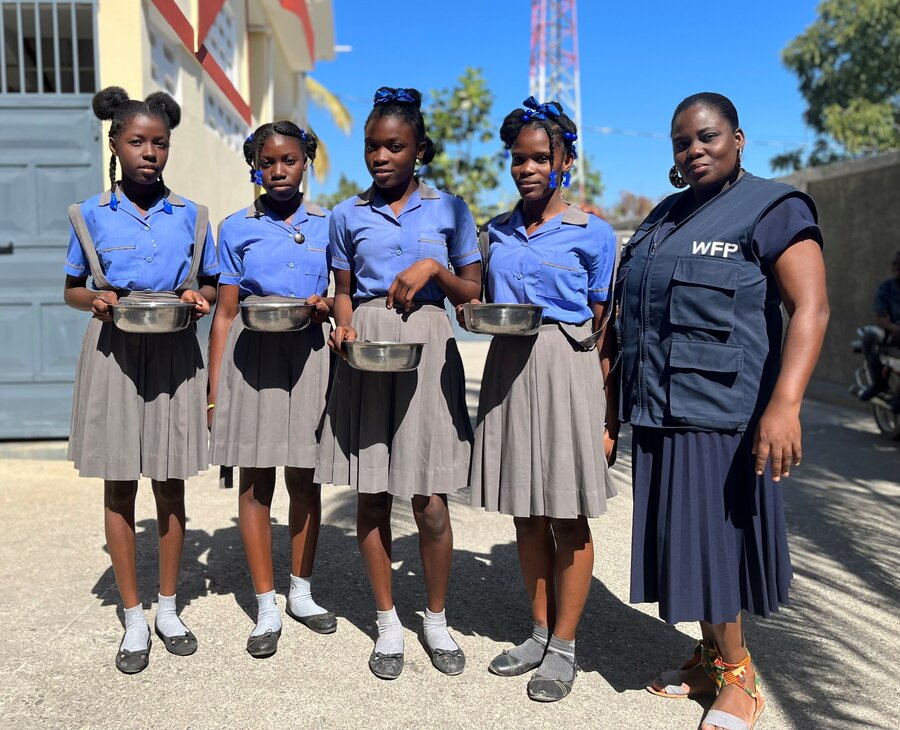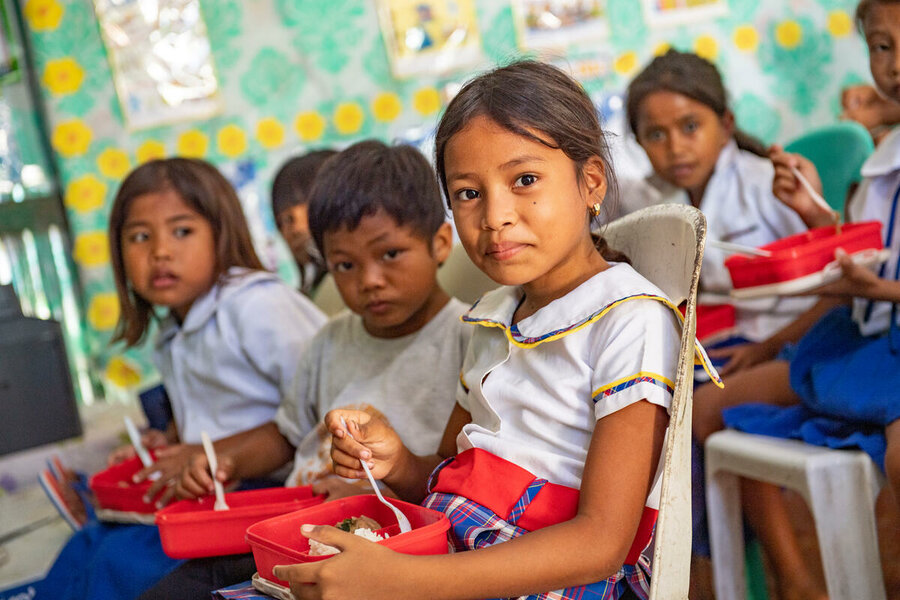4 things you should know about school feeding worldwide
 Ghana runs a school feeding programme
Ghana runs a school feeding programme
In early 2020, before the pandemic resulted in widespread school closures, 388 million children around the world benefited from daily school meals. Today, 418 million - 30 million more - are receiving a meal in school.
Around 41 percent of children enrolled in primary school now have access to a free or subsidized daily school meal, rising to 61 percent in high-income countries.
This recovery’s been largely supported through national budgets, with most governments adopting policies that will help ensure they strap in for the long haul.
School feeding programmes support more than just children: they have created approximately 4 million jobs in 85 countries (that’s 1,377 jobs for every 100,000 children fed). Most of these jobs are related to meal preparation, benefiting local cooks and small catering companies, most of which are led by women.
 A WFP-supported nursery and primary school in Juba, South Sudan. The country has one of the lowest literacy rates in the world. Photo: WFP/Eulalia Berlanga
2. There certainly is political will when it comes to school meals. The leaders of 76 countries, representing 58 percent of the world’s population across all income levels, stood up to co-create the School Meals Coalition. Led by governments, the Coalition is supported by 83 stakeholders, including major UN agencies and development partners.
A WFP-supported nursery and primary school in Juba, South Sudan. The country has one of the lowest literacy rates in the world. Photo: WFP/Eulalia Berlanga
2. There certainly is political will when it comes to school meals. The leaders of 76 countries, representing 58 percent of the world’s population across all income levels, stood up to co-create the School Meals Coalition. Led by governments, the Coalition is supported by 83 stakeholders, including major UN agencies and development partners.
Thanks to the Coalition, and its evidence-based approach, there’s a sea change in the level of political will around school meals. In Rwanda, for example, President Paul Kagame’s administration increased its budget for school meals from US$8 million in 2020 to ten times that in 2022, boosting coverage from 660,000 to 3.8 million students. In Benin, President Talon announced a national budget commitment of US$270 million over the next five years to scale up the national programme.
 WFP agronomist Maguelita Varin at a WFP-backed school in Jeremie, Haiti, where WFP requires urgent funding in the face of rising hunger and rivalry between non-state armed groups. Photo: WFP/Peyvand Khorsandi
3. Despite progress, school feeding coverage is lacking where it is needed most: in low-income countries beset by the global food crisis and struggling to recover from the shutdowns
WFP agronomist Maguelita Varin at a WFP-backed school in Jeremie, Haiti, where WFP requires urgent funding in the face of rising hunger and rivalry between non-state armed groups. Photo: WFP/Peyvand Khorsandi
3. Despite progress, school feeding coverage is lacking where it is needed most: in low-income countries beset by the global food crisis and struggling to recover from the shutdowns
The reach of school meals in low-income countries remains 5 percent below pre-pandemic levels. Despite other demands post-pandemic and cash constraints, low-income countries have increased their domestic funding for school meals by around 15 percent since 2020.
Disappointingly, international support is down from US$267 million in 2020 to US$214 million in 2022.
Development partners, especially international financial institutions, should commit to increasing support for school meal programmes by US$1 billion.
 A school in the Maguindanao province of the Philippines. WFP works with the Government on home-grown meals that support local producers and the community, as well as the children who receive the food. Photo: WFP/Rein Skullerud
4. School meals can reinforce the drive towards ‘climate-smart’ and sustainable food systems that deliver better nutrition and more diverse diets. School-age children are bearing the brunt of the current global food crisis.
A school in the Maguindanao province of the Philippines. WFP works with the Government on home-grown meals that support local producers and the community, as well as the children who receive the food. Photo: WFP/Rein Skullerud
4. School meals can reinforce the drive towards ‘climate-smart’ and sustainable food systems that deliver better nutrition and more diverse diets. School-age children are bearing the brunt of the current global food crisis.
WFP estimates that 349 million people in 79 countries are sliding towards starvation, including 153 million children and young people.
The global annual investment of US$48 billion in school meal programmes creates a huge and reliably predictable market for food and offers an extraordinary opportunity to transform food systems and diets, and to respond proactively to the global food crisis and climate change.
School meal programmes can buy more food within communities and match quality diets to local production, increasing agrobiodiversity and strengthening food sovereignty. This can support smallholder farmers, especially rural women and Indigenous producers.
‘Climate-smart’ school meal programmes could be part of the vanguard of country efforts to become more climate resilient, by diversifying diets, aligning agriculture and procurement to local food sovereignty, and by rethinking energy and farming practices.
Source: World Food Programme






